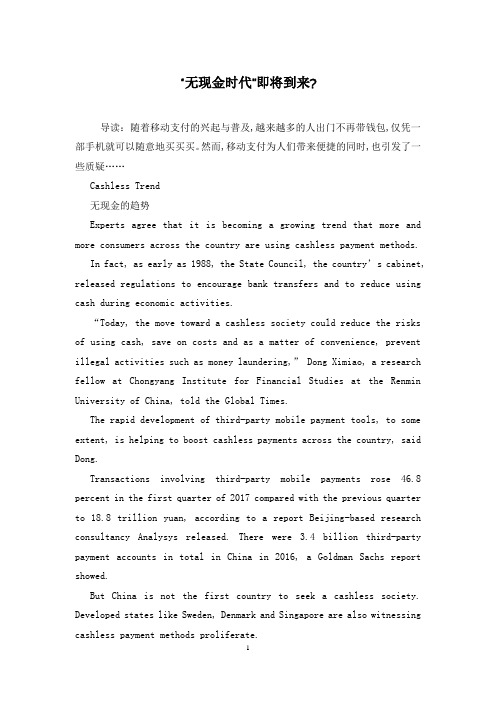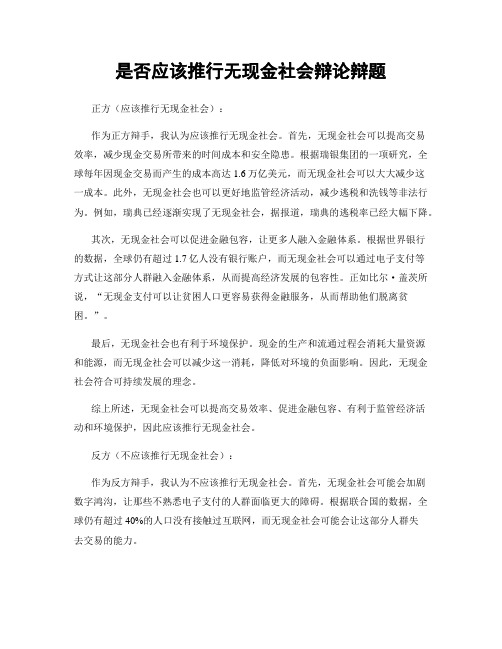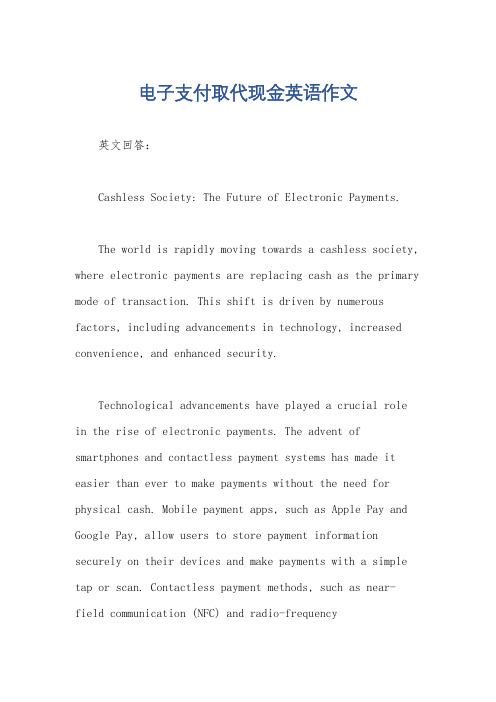无现金社会 cashless society
“无现金时代”即将到来-

“无现金时代”即将到来?导读:随着移动支付的兴起与普及,越来越多的人出门不再带钱包,仅凭一部手机就可以随意地买买买。
然而,移动支付为人们带来便捷的同时,也引发了一些质疑……Cashless Trend无现金的趋势Experts agree that it is becoming a growing trend that more and more consumers across the country are using cashless payment methods.In fact, as early as 1988, the State Council, the country’s cabinet, released regulations to encourage bank transfers and to reduce using cash during economic activities.“Today, the move toward a cashless society could reduce the risks of using cash, save on costs and as a matter of convenience, prevent illegal activities such as money laundering,” Dong Ximiao, a research fellow at Chongyang Institute for Financial Studies at the Renmin University of China, told the Global Times.The rapid development of third-party mobile payment tools, to some extent, is helping to boost cashless payments across the country, said Dong.Transactions involving third-party mobile payments rose 46.8 percent in the first quarter of 2017 compared with the previous quarter to 18.8 trillion yuan, according to a report Beijing-based research consultancy Analysys released. There were 3.4 billion third-party payment accounts in total in China in 2016, a Goldman Sachs report showed.But China is not the first country to seek a cashless society. Developed states like Sweden, Denmark and Singapore are also witnessing cashless payment methods proliferate.专家们承认,国内(中国)越来越多的消费者正在使用无现金的支付方式,这成为一种日渐增长的趋势。
是否应该推行无现金社会辩论辩题

是否应该推行无现金社会辩论辩题正方(应该推行无现金社会):作为正方辩手,我认为应该推行无现金社会。
首先,无现金社会可以提高交易效率,减少现金交易所带来的时间成本和安全隐患。
根据瑞银集团的一项研究,全球每年因现金交易而产生的成本高达1.6万亿美元,而无现金社会可以大大减少这一成本。
此外,无现金社会也可以更好地监管经济活动,减少逃税和洗钱等非法行为。
例如,瑞典已经逐渐实现了无现金社会,据报道,瑞典的逃税率已经大幅下降。
其次,无现金社会可以促进金融包容,让更多人融入金融体系。
根据世界银行的数据,全球仍有超过1.7亿人没有银行账户,而无现金社会可以通过电子支付等方式让这部分人群融入金融体系,从而提高经济发展的包容性。
正如比尔·盖茨所说,“无现金支付可以让贫困人口更容易获得金融服务,从而帮助他们脱离贫困。
”。
最后,无现金社会也有利于环境保护。
现金的生产和流通过程会消耗大量资源和能源,而无现金社会可以减少这一消耗,降低对环境的负面影响。
因此,无现金社会符合可持续发展的理念。
综上所述,无现金社会可以提高交易效率、促进金融包容、有利于监管经济活动和环境保护,因此应该推行无现金社会。
反方(不应该推行无现金社会):作为反方辩手,我认为不应该推行无现金社会。
首先,无现金社会可能会加剧数字鸿沟,让那些不熟悉电子支付的人群面临更大的障碍。
根据联合国的数据,全球仍有超过40%的人口没有接触过互联网,而无现金社会可能会让这部分人群失去交易的能力。
其次,无现金社会可能会增加个人信息泄露和网络安全风险。
随着电子支付的普及,个人的交易信息可能会更容易被黑客窃取,从而增加个人财产安全的风险。
例如,美国曾发生过多起电子支付系统被黑客攻击的案例。
最后,无现金社会可能会剥夺人们的现金支付权利,影响个人的自由选择。
正如约翰·梅尔顿·凯恩斯所说,“如果现金支付被废除,我们将失去一种自由选择的权利。
”因此,无现金社会可能会对个人权利造成影响。
是否应该推行无现金社会?辩论辩题

是否应该推行无现金社会?辩论辩题正方辩手:应该推行无现金社会。
首先,无现金社会可以减少犯罪率。
据统计,大部分抢劫案都是为了抢夺现金而发生的。
如果没有现金,抢劫案件的发生率将大大降低。
其次,无现金社会可以提高经济效率。
现金交易需要大量的时间和资源来处理和管理,而电子支付可以更快捷地完成交易,提高了效率。
此外,无现金社会还可以减少黑市交易和逃税行为,有利于国家税收的增加。
最重要的是,无现金社会可以促进金融包容性,让更多的人都能享受到金融服务,包括那些没有银行账户的人。
因此,推行无现金社会是符合时代潮流和社会发展需要的。
反方辩手:不应该推行无现金社会。
首先,无现金社会可能会导致个人隐私权受到侵犯。
电子支付的信息可能会被监控和泄露,使个人的隐私不再受到保护。
其次,无现金社会可能会排斥一部分人群,特别是那些不熟悉电子支付方式或者没有接触过数字化设备的人。
这些人可能会因为无法适应无现金社会而被边缘化。
此外,无现金社会也会增加依赖于技术的风险,一旦电子支付系统发生故障或被黑客攻击,整个社会的经济秩序都会受到严重影响。
因此,不应该轻率地推行无现金社会。
名人名句:“金钱是一切罪恶的根源。
”——圣经《提摩太前书》6:10。
“金钱是人类历史上最伟大的发明之一,但也是最大的诱惑。
”——约瑟夫·肯尼迪。
经典案例:瑞典是世界上最早开始推行无现金社会的国家之一。
瑞典政府大力推广电子支付,几乎所有的商家都接受电子支付,现金交易已经非常罕见。
然而,这也导致了一些问题,比如老年人和偏远地区的居民因为无法适应电子支付而面临生活困难。
同时,瑞典也面临着电子支付系统被黑客攻击的风险,一旦发生系统故障,整个社会的经济秩序都将受到严重影响。
综上所述,无现金社会在一定程度上可以带来便利和效率,但也会带来一些问题和风险。
因此,在推行无现金社会时,需要权衡利弊,采取合适的措施来解决相关问题。
是否应该推行无现金社会?辩论辩题

是否应该推行无现金社会?辩论辩题正方,应该推行无现金社会。
首先,无现金社会可以有效减少犯罪率。
据统计,很多犯罪活动都是以现金交易为基础的,比如贩毒、走私等。
而无现金社会可以让所有的交易都留下电子记录,有助于打击犯罪活动。
其次,无现金社会可以提高经济效率。
现金交易需要花费大量时间和成本来处理和管理,而无现金社会可以让交易更加便捷和高效,促进经济的发展。
此外,无现金社会可以减少税收漏税。
现金交易往往容易逃避税收,而无现金社会可以让所有交易都留下记录,有助于提高税收征收的效率。
最后,无现金社会可以促进金融创新。
随着无现金社会的推行,金融科技将得到更大的发展空间,可以推动金融行业的创新和进步。
因此,我们认为应该推行无现金社会,以促进社会的发展和进步。
反方,不应该推行无现金社会。
首先,无现金社会可能会造成数字鸿沟。
在一些偏远地区和发展中国家,人们可能无法享受到无现金社会带来的便利,导致数字鸿沟的加剧。
其次,无现金社会可能会损害隐私权。
所有的交易都将留下电子记录,可能会被滥用,侵犯个人的隐私权。
此外,无现金社会可能会增加金融风险。
依赖电子交易可能会使人们更容易受到网络攻击和欺诈行为的影响,增加金融风险。
最后,无现金社会可能会排斥一部分人群。
一些老年人和贫困人群可能无法适应无现金社会,导致他们在经济和社会活动中的边缘化。
因此,我们认为不应该推行无现金社会,应该保留现金交易的方式,以保障社会的公平和包容。
名人名句及经典案例。
“金钱是万恶之源”,这句名言表明了现金交易可能会引发各种社会问题,而无现金社会可以一定程度上减少这些问题。
另外,以瑞典为例,该国已经在向无现金社会迈进,通过推行无现金支付,瑞典取得了很多积极的成果,比如减少了犯罪率、提高了经济效率等等。
这个案例可以作为无现金社会的成功范例。
综上所述,无现金社会有其积极的一面,但也存在一些问题。
我们需要权衡利弊,寻找一个更加平衡和包容的解决方案。
浅析无现金社会

四、企业社会责任会计报告的信息披露
3、在官方网站上披露社会责任信息:企业可以在官方网站上设置社会责任板 块,详细介绍企业在社会责任方面的表现和行动。
四、企业社会责任会计报告的信息披露
4、参与第三方评价:企业可以参与第三方评价,通过评价结果来了解自己在 社会责任方面的表现和不足。
五、结论
五、结论
内容摘要
其次,音乐的审美功能。音乐的美是独特的,它可以直接触动人的情感,唤 起人们的共鸣。音乐的审美功能表现在许多方面,例如,它可以提高我们对美的 感知能力,培养我们的审美趣味,以及塑造我们的审美观念。通过音乐,我们可 以感受到生活的美好,体验到人生的丰富多彩。
内容摘要
最后,音乐的教育功能。音乐的教育功能是潜移默化的,它可以在无形中影 响人们的思想和行为。例如,在抗战时期,聂耳的《义勇军进行曲》就鼓舞了无 数中华儿女投身到抗日战争中。此外,音乐也可以培养人们的道德品质和审美情 趣。例如,莫扎特的《安魂曲》就表现出了他对人类苦难的同情和对人类美德的 赞美。
二、优点分析
3、促进无纸化环保:无现金社会减少了纸质货币的使用,降低了纸张的消耗 和浪费,同时减轻了环境压力,具有环保意义。
三、挑战分析
三、挑战分析
1、习惯养成难度大:虽然无现金支付方式在便捷性和安全性方面具有明显优 势,但部分人群由于年龄、文化背景等原因,对新兴支付方式的接受程度较低, 仍偏好使用现金进行交易。
四、启示与建议
4、加强合作与交流:加强金融机构、科技公司与政府之间的合作与交流,共 同推动无现金社会的建设和发展。例如,金融机构可以与科技公司合作研发更安 全、便捷的支付产品,政府可以出台政策支持金融机构和科技公司在无现金社会 领域的创新和发展。
五、结论
电子支付取代现金英语作文

电子支付取代现金英语作文英文回答:Cashless Society: The Future of Electronic Payments.The world is rapidly moving towards a cashless society, where electronic payments are replacing cash as the primary mode of transaction. This shift is driven by numerous factors, including advancements in technology, increased convenience, and enhanced security.Technological advancements have played a crucial role in the rise of electronic payments. The advent of smartphones and contactless payment systems has made it easier than ever to make payments without the need for physical cash. Mobile payment apps, such as Apple Pay and Google Pay, allow users to store payment information securely on their devices and make payments with a simple tap or scan. Contactless payment methods, such as near-field communication (NFC) and radio-frequencyidentification (RFID), enable quick and convenient transactions without the exchange of any physical objects.Convenience is another key driver behind the adoption of electronic payments. Carrying cash can be cumbersome and risky, especially in large amounts. Electronic payments offer a hassle-free and secure alternative, eliminating the need to carry cash or worry about losing it. Additionally, electronic payments can be made from anywhere with an internet connection, making it convenient for online purchases and remote transactions.Security is another important aspect that has contributed to the increasing popularity of electronic payments. Cash is prone to theft, loss, and counterfeiting. Electronic payments, on the other hand, are typically protected by encryption and other security measures, making them more secure than cash. Payment providers often implement fraud detection systems to identify and prevent unauthorized transactions.Despite the numerous advantages of electronic payments,there are certain challenges and concerns that need to be addressed. One concern is the limited access to and availability of electronic payment systems, particularly in underserved areas. Additionally, there are some who prefer the anonymity and privacy provided by cash transactions.To fully realize the benefits of a cashless society, it is essential to address these challenges and concerns. Governments and payment providers must collaborate to ensure that electronic payment systems are accessible and inclusive for all. Additionally, it is important to develop and implement robust security measures to safeguard consumer data and prevent fraud.中文回答:无现金社会,电子支付的未来。
2024年无现金社会悄然兴起

05
商家适应策略及案例分析
Chapter
商家如何适应无现金社会趋势
数字化支付系统
商家需要建立数字化支付系统, 包括电子钱包、移动支付等,以
接受消费者的无现金支付。
优化支付流程
商家应优化支付流程,确保快速、 安全地完成交易,提升消费者体验 。
数据管理与分析
商家需建立完善的数据管理系统, 分析消费者支付行为,为精准营销 和个性化服务提供支持。
随着无现金社会的深入发展,网 络安全、数据隐私等问题将成为 重要挑战,需加强相关法规和监 管措施。
全面数字化 跨境支付便利化 金融体系变革
挑战与风险
未来,数字化支付将覆盖更多领 域,包括公共交通、医疗、教育 等,实现全面数字化。
无现金社会的发展将推动金融体 系的变革,提高金融服务的普惠 性和便捷性。
提供税收优惠和补贴
政府可以通过提供税收优惠和补贴等方式,降低无现金支付的成 本,提高其普及率和可接受性。
加强教育和宣传
政府应加强无现金支付的教育和宣传,提高公众对无现金社会的 认知度和接受度。
加强监管,确保市场公平竞争和消费者标准,规范无现金支付市场的秩序,确 保市场的公平竞争和消费者的权益保护。
06
消费者体验变化与心理调适
Chapter
消费者在无现金社会中体验变化
支付方式变革
随着移动支付、数字货币等新型支付方式的普及,消费者逐渐摆脱 对传统现金的依赖,享受便捷、高效的支付体验。
购物方式转变
无现金支付的普及推动了线上购物、无人超市等新型购物方式的发 展,消费者可以随时随地完成购物,且无需排队等候。
数据安全
保障用户数据和交易数据的安全,包括数据的加 密存储和传输,以及防止数据泄露和被滥用。
无现金社会英语作文

无现金社会英语作文English Answer:As technology continues to advance at an unprecedented pace, the world is rapidly moving towards becoming a cashless society. The use of physical cash is declining as people increasingly embrace digital payment methods such as credit cards, debit cards, and mobile wallets. This shift has significant implications for both individuals and society as a whole.One of the primary benefits of a cashless society is convenience. Digital payments are faster, easier, and more secure than traditional cash transactions. With a tap of a card or a scan of a smartphone, consumers can complete transactions in a matter of seconds. This saves time and effort, particularly in busy environments such as supermarkets or public transportation. Additionally, cashless payments eliminate the risk of carrying large amounts of cash, reducing the likelihood of theft or loss.Furthermore, a cashless society can promote financial inclusion. By providing alternative payment methods,digital payments make it possible for individuals who maynot have access to traditional banking services to participate in the financial system. Mobile wallets, for example, can be accessed by anyone with a smartphone, regardless of their credit history or socioeconomic status. This increased financial inclusion can lead to greater economic equality and stability.However, there are also some potential drawbacks to a cashless society. One concern is the potential for privacy breaches. When individuals make digital payments, they provide personal information that can be collected and used by companies and governments. This raises concerns about data security and the potential for identity theft. Governments and financial institutions must implementrobust measures to protect consumer data and prevent misuse.Another challenge is the digital divide. While digital payment methods are becoming increasingly widespread, thereare still some individuals who do not have access to the necessary technology. This can create a barrier tofinancial inclusion and limit the benefits of a cashless society. Governments and organizations need to address the digital divide by providing affordable internet access and financial literacy programs.Overall, the transition to a cashless society offers numerous advantages, including convenience, financial inclusion, and efficiency. However, it also presents challenges related to privacy and digital inequality. By carefully considering these factors and implementing appropriate measures, governments and financialinstitutions can harness the benefits of a cashless society while mitigating the potential risks.中文回答:随着技术以前所未有的速度不断发展,世界正在快速走向无现金社会。
- 1、下载文档前请自行甄别文档内容的完整性,平台不提供额外的编辑、内容补充、找答案等附加服务。
- 2、"仅部分预览"的文档,不可在线预览部分如存在完整性等问题,可反馈申请退款(可完整预览的文档不适用该条件!)。
- 3、如文档侵犯您的权益,请联系客服反馈,我们会尽快为您处理(人工客服工作时间:9:00-18:30)。
无现金社会cashless society
China was the first country in the world to use paper money but centuries later the soaring popularity of mobile payment has some analysts forecasting it could become the first cashless society in the next decade.
中国是世界上第一个使用纸币的国家,但到了几个世纪后的现在,随着移动支付的普及程度不断提高,一些分析师预测,中国或在未来十年成为首个无现金社会。
中国正掀起一场无现金革命(cashless revolution)。
上海的一家面馆或深圳的一名街头艺人(busker)在收款时,只需要一个免费的微信账号和一个打印好的二维码(a free WeChat account and a printout of a QR code)。
在中国大部分地区,几乎每台收银机(cash register)旁边都有二维码。
艾瑞咨询称,2016年,中国第三方移动支付成交商品总额(gross merchandise value of third-party mobile payment)较上年同期增长了逾200%,达到38万亿元。
中国市场研究集团估计,中国的移动支付市场(mobile payment market)规模已经是美国的40-50倍。
移动支付的最大吸引力在于方便(a key attraction of mobile payment is convenience),人们可以携带少量或不带现金出行。
然而,移动支付的安全性也越来越引起关注。
联合国的"优于现金联盟(Better Than Cash Alliance)"称,移动支付方仍在努力实现创新与监管之间的平衡(balance between innovation and regulation),且在积极地采取措施来降低财务风险和欺诈(reduce financial risk and fraud)。
相关词汇
金融工具financial instruments
实体店bricks and mortar store
短期贷款short-term lending
消费者和商业信用评分consumer and business credit scoring。
